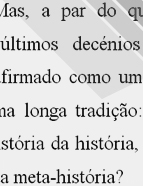

................................
The critical interest in the historiography produced in Portugal continued to flourish during the period of the Constitutional Monarchy. Examples include the extensive debates surrounding Alexandre Herculano’s História de Portugal and Oliveira Martins’s História de Portugal (1879). It is telling that these debates largely centred on the question of the nation’s origins. In the case of Herculano, the controversy arose from the fact that he disregarded the mythical and providentialist tradition of Ourique in the formation of Portugal in the 12th century and challenged another historical tradition that had been deeply rooted since the 15th century : the continuity between the Portuguese and the Lusitanians. In 1880, debates around Oliveira Martins’s work focused on the rational arguments he used to explain the formation of Portugal. ; before Renan, Martins had defended an elective and voluntarist concept of the nation, emphasising the role of civic consciousness in the process of nationalisation and distancing himself from the ethnic determinism that was widely popular at the time. On the other hand, Oliveira Martins offered a highly critical assessment of Portuguese historiography, which included a relevant periodisation of the writing of history in Portugal. He identified three key moments: the Royal Academy of History (1720–31), the Royal Academy of Sciences (1779–96), and the contributions of Alexandre Herculano. He also dismissed the historical novel as a “hybrid and false genre” (" Notas sobre a historiografia... " ["Notes on historiography..."] História de Portugal, 1942 [1886], vol. II, p. 326). Another of Oliveira Martins's notable and debatable theories was that, in each of these moments, Portuguese historiography had failed to establish a tradition or “a school of historical studies.” His critical stance was also evident regarding the flourishing historical commemorativ e practices of positivist inspiration that emerged from 1880 onwards (e.g., the tricentennial of Camões).
